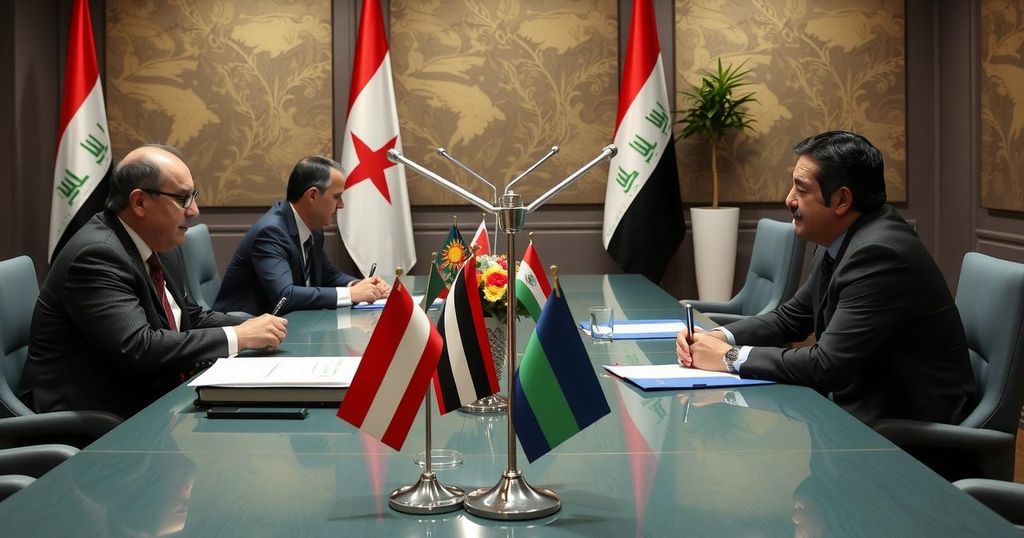Blinken Urges Iraq to Confront Iranian Influence Amid Regional Shifts

During his visit to Iraq, U.S. Secretary of State Antony Blinken urged the Iraqi government to confront Iranian-backed militias and enhance Iraq’s sovereignty following the recent geopolitical shifts in Syria. His discussions with Prime Minister Mohammed Shia al-Sudani focused on limiting Iranian influence and preventing arms transfers across borders while addressing the threats posed by the Islamic State.
In a pivotal diplomatic effort, U.S. Secretary of State Antony Blinken urged Iraq to undertake a decisive stance against Iranian-backed militias during his recent visit to Baghdad. Following the military setbacks faced by Tehran in Syria, particularly after the fall of President Bashar al-Assad’s regime, Blinken perceived a unique opportunity for Iraq to diminish Iran’s influence. He encouraged Iraqi Prime Minister Mohammed Shia al-Sudani to restrict these militias, which have historically threatened U.S. troops in the region, and to prevent the transfer of Iranian armaments across Iraq to affiliated factions in Syria.
During their meeting, Blinken expressed the United States’ commitment to bolster Iraq’s sovereignty, emphasizing the significance of this period for Iraq to strengthen its stability and security. This diplomatic engagement occurred against the backdrop of Iranian ascendancy following the 2003 U.S. invasion, which ousted Saddam Hussein, historically an adversary of Iran. The aftermath of the recent conflict in Syria and the ongoing strife involving Hezbollah and Israel further complicated the regional dynamics.
Moreover, Blinken reiterated the importance of collaborative efforts to thwart a resurgence of the Islamic State, which once enforced a self-declared caliphate over extensive areas in Iraq and Syria. Despite the complex relations between Iraq and Iran, with Iraq’s government maintaining close ties to Tehran, Blinken’s discussions sought to promote a strategic recalibration in favor of Iraq’s independence and regional stability.
The Biden administration continues to navigate this intricate landscape, having approved waivers permitting Iraq to purchase Iranian electricity amidst sanctions, a decision met with criticism from some U.S. lawmakers. This delicate balance underscores the broader geopolitical tensions as the incoming administration of President-elect Donald Trump is anticipated to adopt a more stringent approach towards Iran, while simultaneously expressing openness for diplomatic engagement.
The relationship between Iraq and Iran is deeply intertwined, particularly following the U.S.-led invasion of Iraq in 2003, which resulted in the regime change that benefited Iranian interests in the region. Iranian-backed militias have since become influential in Iraq, often challenging U.S. presence and operations there. The Syrian conflict has also altered regional power dynamics, especially after the weakening of the Assad regime, which has historically relied on Iranian support. With the U.S. administration navigating its policies towards Iran, this diplomatic effort by Blinken aims to encourage Iraqi leadership to assert its sovereignty and reduce foreign influence, particularly from Iran.
In sum, Secretary Antony Blinken’s recent discussions with Iraqi Prime Minister Mohammed Shia al-Sudani highlighted critical opportunities for Iraq to recalibrate its stance towards Iranian influence. With the geopolitical landscape shifting following significant events in Syria, the U.S. seeks to empower Iraq’s sovereignty while addressing the threats posed by Iranian-backed militias and the resurgence of extremist groups. The ongoing negotiations reflect a delicate balance of maintaining U.S. interests in the region while engaging with Iraqi leadership amid complex Iranian ties.
Original Source: www.france24.com








